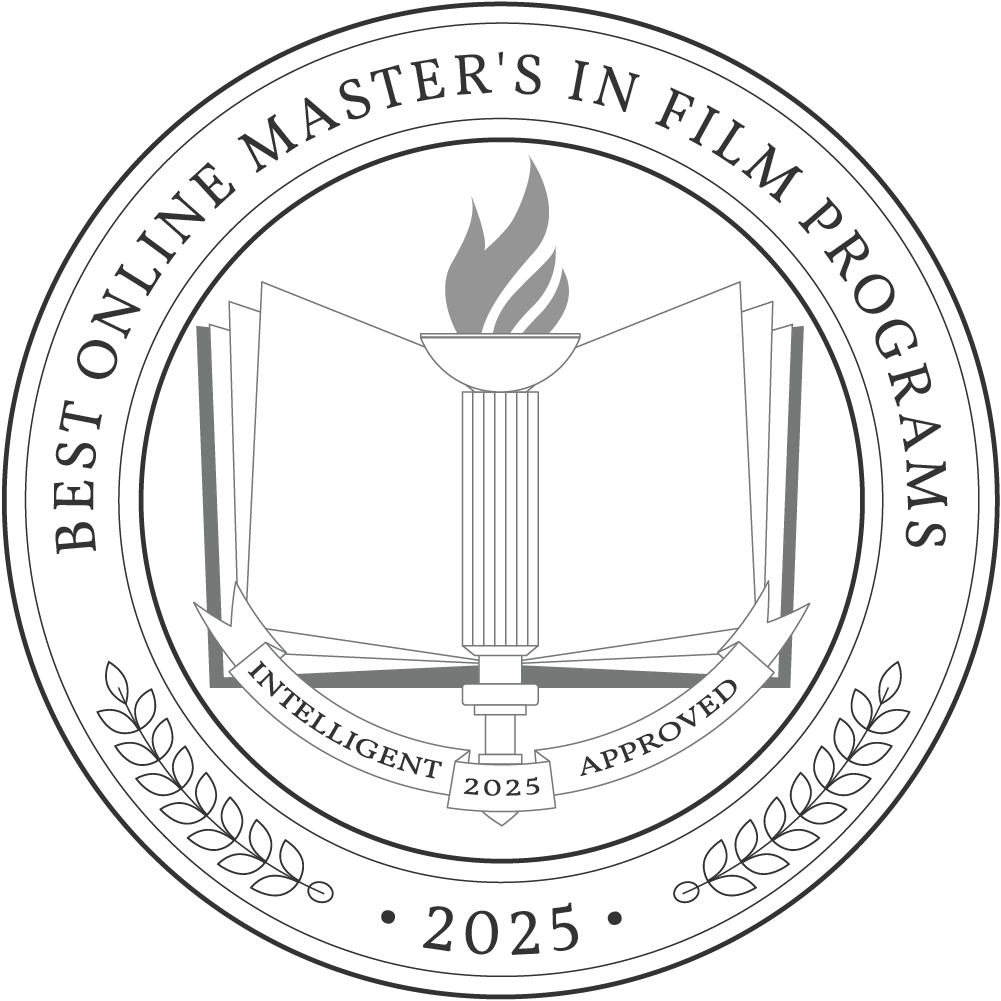How to Choose an Online Master’s in Film Program
Choose your area of study
Institutions use different naming conventions for their film-related graduate degrees, but they all fall under a Master of Arts (MA) or a Master of Fine Arts (MFA) umbrella. MA programs are humanities-driven and more focused on the practical application of knowledge. MFA degrees concentrate on a specific artistic discipline.
It’s also worth noting that many programs will allow you to select a concentration and focus your studies on a particular niche in this field, such as producing, screenwriting, or motion media design. If you already know what you would like to do after you graduate, look for programs that closely match these career goals.
Research schools and programs
You should only apply to institutions that have been approved by a DOE-recognized regional accrediting organization, such as the New England Commission of Higher Education or Northwest Commission on Colleges and Universities. These organizations evaluate schools to ensure they provide students with a high-quality education. Those who attend a school that isn’t regionally accredited may be unable to access financial aid or transfer credits to another institution if needed.
Ideally, your master’s in film program will also be accredited by a respected industry group like the National Association of Schools of Art and Design (NASAD). This programmatic accrediting organization has particularly high standards for art education.
After confirming that each school meets basic accreditation standards, consider the following:
- What support services do online students have access to? Online students should receive similar benefits and support services as traditional on-campus students. Seek programs where online attendees receive free tutoring, counseling, academic advising, student software discounts, and reliable tech support.
- Does the program include an internship or hands-on experience? Many programs integrate practical applications into the coursework. Some film degrees require a thesis component and encourage students to graduate with a portfolio of promising work.
To learn more about any schools that you’re interested in, you can visit the school’s website, contact an admissions counselor, follow the school on social media, or attend an in-person or virtual open house.
Prepare for tests and applications
Application requirements vary by school and program. Most programs request a portfolio of your work or some film-related assignment to review alongside your application materials. Few programs require standardized testing.
Because of the specialized nature of this field, graduate film degree programs can be competitive and have a limited number of spots available. To submit your application by the deadline, ensure you’ve allowed ample time to pull together transcripts, recommendation letters, a personal statement, and any other materials that may be required.
Before submitting an application, always contact an admissions counselor to ensure you have the most accurate information regarding requirements and deadlines.
Select your program
Upon receiving your acceptance letters, you’ll need to decide on which program to attend (and commit to the associated enrollment fee).
Before making your final decision, review your needs and goals again. Do you plan to attend school full-time or part-time? Do you want your program to be as online as possible, or are you fine with a hybrid program that has a fair amount of in-person requirements? Some programs offer asynchronous courses, which can be completed at your own pace, while others only offer synchronous courses, which involve remotely attending lectures and completing assignments at the same time as other students — which of these two online learning formats do you prefer? Your school should accommodate your scheduling needs and learning preferences.
Determine how you’ll pay for your degree
Like any graduate degree, the tuition for an online master’s in film is a financial commitment. Speak early and often to your selected school’s office of financial aid; these individuals can help you identify funding opportunities and a payment plan that works for you.
Graduate school scholarships and assistantships are competitive but worth applying for nonetheless. Some programs provide military discounts or credit for previous professional experience. All attendees should complete the FAFSA; while you might not want to take out loans, it’s helpful to determine the federal funding options for which you’re eligible. Those who already work in the field should see if their employer offers tuition assistance benefits as well.
What Can You Expect from an Online Master’s in Film Program?
Online master’s in film students engage in theoretical discussions and practical, experiential activities related to professional roles in the film industry or further academic study. They’ll examine different genres and forms of criticism, practice the fundamentals of storytelling and editing, and explore new funding and marketing strategies for bringing a film from script to screen. Many programs integrate internship or project-based coursework with actual media companies, helping students get a foot in the door of this highly competitive industry.
Some master’s in film programs are just 30 credit hours, though some require as many as 50. Nonetheless, full-time attendees can finish in two to three years. Online film degrees are predominantly remote, but many feature scheduled coursework and some in-person workshops and networking opportunities. All programs conclude with a final evaluation, typically a thesis or final project that prepares graduates for the next step in the film and media industry.
Potential courses you’ll take in an online master’s in film program
- The Story Development Process. Through the lens of the modern entertainment industry, this course introduces students to the screenwriting process, exploring the steps involved from story concept to page.
- Marketing, Distribution, and Exhibition. Participants discuss the necessary financing and marketing plan for a successful media project. Students learn about traditional distribution methods and new marketing avenues and technology.
- Editing Practice and Theory. Students study the theory and application of film and video editing. Participants use software editing applications and techniques, emphasizing post-production practice.
- Sound for Picture. Students learn how to create and edit sound for film and television. Featured techniques include sound mixing and automated dialogue replacement (ADR).
What Can You Do With an Online Master’s in Film?
Career outlook
With the rise of streaming platforms, online distribution channels, and independent film production, the opportunities for film professionals have expanded beyond traditional avenues. The demand for skilled professionals who can create high-quality content remains strong. As the industry evolves, so do the job prospects for individuals with a master’s in film, with roles ranging from film production and direction to post-production and visual effects.
Here are some of the more common career paths for those with a master’s degree in film:
- Film editor or camera operator — Capture and manipulate footage for television, film, and other media.
- Median annual salary: $65,070
- Projected employment growth (through 2032): 7%
- New job openings projected: 8,200 annually
- Broadcast, sound, or video technician — Set up and operate the electrical equipment that’s needed to produce media programs.
- Median annual salary: $54,160
- Projected employment growth (through 2032): 2%
- New job openings projected: 12,900 annually
- Producer or director — Select scripts, audition cast members, oversee performances and camera operation, and make other business and creative decisions regarding film and television productions.
- Median annual salary: $82,510
- Projected employment growth (through 2032): 7%
- New job openings projected: 16,000 annually
Online Master’s in Film Degree Frequently Asked Questions
How do I apply to an online master's in film degree program?
Film program websites should outline specific application instructions. Follow these carefully and be mindful of deadlines. Before officially applying, determine whether your undergraduate coursework and GPA meet eligibility for program acceptance. For questions or concerns, speak to an admissions counselor or program advisor.
While exact requirements vary, a typical application for an online master’s in film degree includes the following:
- A completed application form
- Official transcripts from an accredited undergraduate program
- Letters of recommendation
- An application fee
- A professional resume
- A sample or portfolio of your film-related work
- A film-related writing assignment
Some programs also require that candidates interview with a faculty member.
How much does an online master's in film degree cost?
The average annual cost of graduate school tuition is $20,513. Private schools are usually more expensive than public schools, though public schools often charge out-of-state students a higher tuition rate than in-state students.
Film students must also factor in the cost of books, necessary visual equipment, and editing software. You might need to invest in an updated computer and reliable internet for this software to function. Online attendees living near campus could leverage on-campus computer labs featuring the necessary software. Finally, you’ll be responsible for your film production costs.
How long does it take to earn an online master's in film degree?
Online graduate students can enroll in coursework full-time or part-time. Full-time students can complete the program in two to three years. Individuals supporting families and other professional obligations may instead attend part-time, spreading coursework across three to four years.
Is an online master's in film worth it?
Earning an online master’s in film degree can provide numerous benefits. This advanced degree can help you stand out in a competitive industry, demonstrating your commitment to honing your craft and expanding your expertise. Additionally, a master’s degree can open doors to leadership roles and allow you to take on more creative and challenging projects.
An online master’s in film program offers unique advantages. It allows you to access learning materials and engage with instructors and peers from the comfort of your own home or another convenient location, providing flexibility for individuals with busy schedules or those who prefer remote learning environments.
Furthermore, the networking opportunities provided by an online master’s program are invaluable. You’ll have the chance to connect with other aspiring filmmakers, industry professionals, and potential collaborators. These connections can lead to internships, job opportunities, and partnerships that significantly impact your career trajectory.
Read More About Online Master’s in Film Degrees




